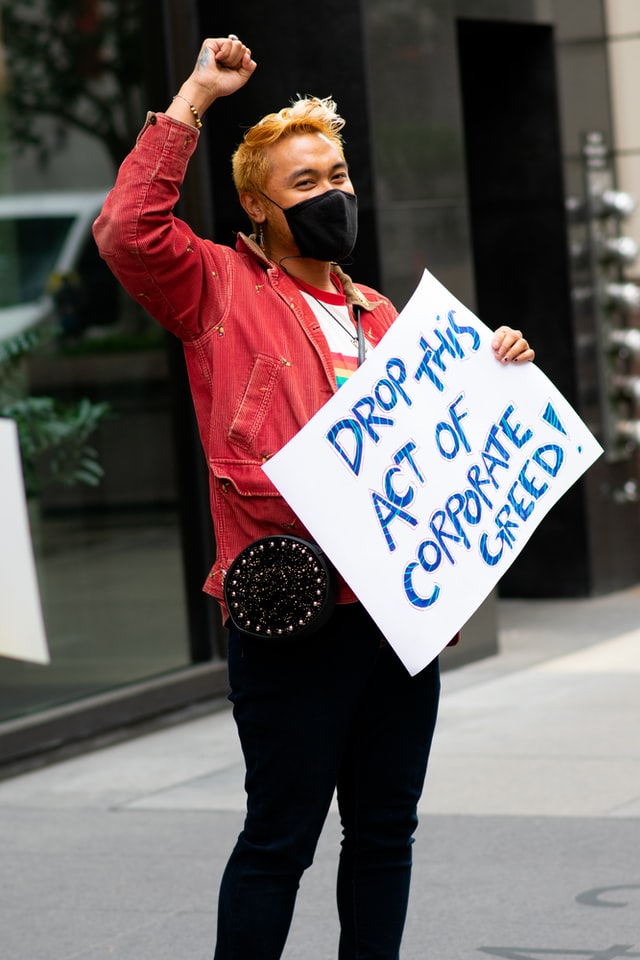To penetrate the veil of corporate virtue signaling, never judge a company by its commercials.

Over the decades, advertisers have used all sorts of marketing ploys to get people to buy their products.
Driving this car will make you more successful, wealthier. Buying that handbag will make you popular; buying this perfume will make you irresistible.
Marketers have used sex, stardom, and status to sell us things over the years; they’ve used pride, greed, envy- everything.
Advertisers and the companies who hire them have jumped on every potentially lucrative bandwagon to come along over the past decades. If patriotism will sell us things, they use patriotism. When “FOMO” was all the rage, advertisers used that.
None of these has been the favorite of advertisers and marketers though, the ultimate panacea of selling human beings things they didn’t know they needed or wanted.
Using sex in advertising has a sell-by expiration date- it doesn’t appeal to everyone. Fads like FOMO come and go; by the time corporations catch up, the fad isn’t even cool anymore, and the veneer of corporate vernacular certainly doesn’t help.
The advertiser’s favorite trick by far- the best, most versatile, dependable sales device ever used on mankind- is using our insecurities to sell us things.
Everyone is insecure and afraid about something. Too old, too young; too big, too small. Too much hair; not enough hair- ad infinitum.
Sometimes, whole groups of people are insecure about a certain thing, or can be made to feel insecure. Advertisers who stumble upon that particular gold mine are known to hawk things like deodorants and weight-loss drugs.
Is it predatory?
Do advertisers market to children?
Of course it’s predatory.
Ronald McDonald, Tony the Tiger, Toucan Sam; every cartoon mascot hawking an unhealthy, nutritionally empty, sugar-laden ticket to childhood obesity was a liar and a cheat.
Marketing to children is right up there with single-use plastics; gross, passé.
Popeye was the only notable exception. Spinach, as he rightly impressed upon young minds, is excellent for you.
Older people are afraid of having an accident at home and not being able call for help; enter “I’ve fallen and I can’t get up!”
Is LifeAlert meeting a legitimate need? Yes. Are they using fear to sell it? Also yes. Plenty of competitors trying to meet a legitimate need in the marketplace; using fear, human insecurity and any number of other manipulative tricks can help one company stand above another.
Now, companies may have discovered the ultimate advertising trick- the perfect human weakness to prey on, with a loophole large enough to drive a truck through.
People want to make a difference, and they worry about not making a difference; and thinking about doing something about it feels almost as good as actually doing it.
It’s why making a to-do list feels so great; it’s why McDonald’s put salads on the menu, though it doesn’t sell many; just thinking about doing something tricks our minds into thinking we’ve actually done it.
Using this, advertisers are trying to trick consumers into thinking they can make a difference in the world- but only if they buy North Face jackets, or Nike brand sportswear.
That isn’t to say that voting with your dollars, that is, supporting businesses and companies who share your values, isn’t laudable; it is. It is also a very powerful tool in a free market economy.
But you can’t tell how good a company is from their commercials. You can’t tell much of anything from a commercial. In fact, most of the best, most responsible and sustainable companies don’t advertise at all.
Wearing Nike and NorthFace doesn’t make you a good person, it doesn’t even mean you are supporting companies that share your values, unless your values involves pretending to care about a cause you are doing nothing about.
Nike isn’t a supporter of social justice initiatives- unless your idea of social justice is exploiting low-wage workers and relaxed regulatory environments in emerging nations for maximum profit.
NorthFace isn’t doing anything at all about our dependence on petroleum products, unless you count refusing to make jackets for an oil executive retreat- while making jackets out of petroleum products.
It isn’t that they think we’re stupid; it’s that advertisers have been hoodwinking us for decades.
Preying on our desire to make the world a better place, while doing nothing to make the world a better place, is corporate virtue signaling. It is a publicity stunt designed to go viral and generate revenue.
If you want to support companies who care about your values, do it. But don’t judge a book by its cover. And never judge a company by its commercials.
(contributing writer, Brooke Bell)